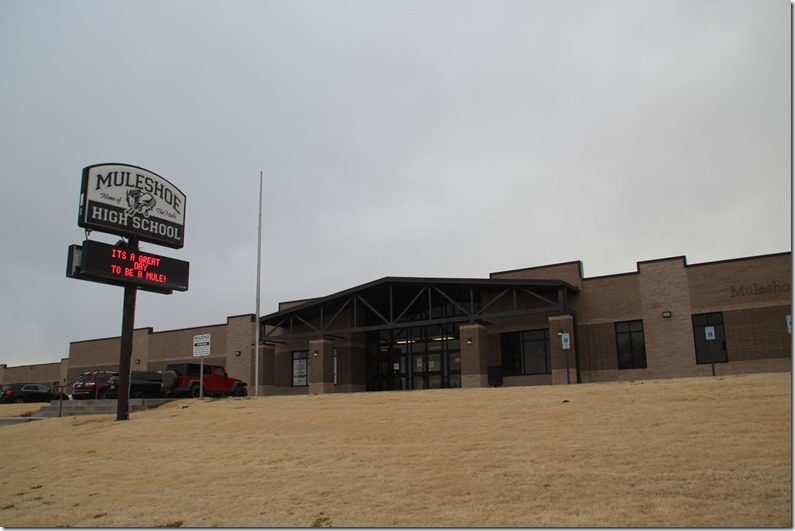When I wrote about how nurses at Muleshoe Area Medical Center were dealing with COVID-19 (“Small Town Nurses and COVID-19”, January 19, 2021), I wondered if the pandemic is negatively affecting young people’s interest in entering the field of nursing and medicine. I called former student Sharon Johnson Riegel at Muleshoe High School for her observations.
Sharon started school in Muleshoe, moved after eleventh grade and graduated from Adrian in 1996. She studied nursing at Howard College in San Angelo in 2007, and has been in the medical profession for twenty-two years serving as a nurse’s aide, surgical technician, and LVN. In 2009 she joined Muleshoe High School as the school nurse and taught one nurse’s aide class. Now she also teaches classes in the CTE (Career and Technical Education) program and pulls shifts as an EMT Intermediate with Bailey County EMS.
Since Sharon works with students preparing for a career in medicine, she seemed like the right person to answer my question. When I asked her if COVID had affected enrollment and interest in the health classes, she jumped right in and enthusiastically responded, “Oh, no, the program is still growing!”
A variety of subjects are offered as electives for students wishing to get into the medical field. In most cases, these classes are taken by upper classmen since prerequisite classes are required for some of them. Classes in which students can earn certification are usually taken as seniors because of age requirements. Students are made aware that a high level of commitment is required from them before they enter the program.
Classes offered in the Health Sciences department include science theory, basic EMT, and CCMA, taught by Sharon Riegel, medical terminology taught by Claudia Longoria, anatomy and physiology taught by Pam Doolittle, counseling and mental health taught by Angela Richards.
Sharon said one way the pandemic had affected the high school program was forcing the change from Certified Nurse’s Aide (CNA) classes to Certified Clinical Medical Assistant (CCMA). Both classes lead to nurse’s aide certification, but because of the shut-down on visitors, the students would have to do virtual clinicals with the nursing home for the CNA classes. They would be allowed to do on-site clinicals at the hospital and Dr. Purdy’s office for the CCMA classes, which would allow a wider variety of skills to be taught and used. Sharon wanted the students to have the chance to gain the hands-on experience that would be allowed with CCMA, so they switched to that program at the beginning of this school year.
Something else brought on by the virus is the increased emphasis placed on wearing the N95 masks, so medical students from Texas Tech University will be coming over to conduct tests and inspections to instruct the kids on proper use and fitting of those masks.
Sharon likened these important hands-on clinicals to a skills lab where the students get to do rotations that involve patient care, such as taking vital signs, giving injections, changing dressings, bathing patients, learning EKGs, and taking blood sugars. Because of the personal nature of these hands-on procedures in the clinicals, it is important that students and their parents understand that they will see and do things they might not have considered or expected, so she has a meeting with parents to educate them as well as prospective students to make sure they don’t encounter any surprises. The situations the kids will face also give them a chance to see if medicine is really what they want to do. Working with sick people will also expose them to myriad germs and diseases, not just the coronavirus, so these classes allow the students to really see what they will be getting into, and they can make an educated decision about medicine being the career for them.
If the answer to that is yes, then another reason to take these classes is that they will graduate with certifications and class credit hours that will give them a jump-start when pursuing further degrees in the field of medicine.
Sharon said she enjoys watching them learn the skills in class, like taking fake blood from a fake arm, and then watching them connect that to a real person. The students also enjoy talking to nurses already in the field. The students were recently mesmerized when family nurse practitioners Kristen Neely and Keith Covey from the hospital ER and Dr. Purdy’s office came to visit with them and shared some of their experiences.
Because of the stress and workload this pandemic has created, I think it might be expected that nursing as a career has taken a hit in some areas and a few early retirements have been chosen. But based on what’s happening at Muleshoe High School and the work of these dedicated teachers, plenty of eager, caring, intelligent young people are going to be there to take care of us in spite of this pesky virus.
I feel better already.
Thanks to Sharon Riegel and Suzanne King for their help with this story.

This is great, what a wonderful program for your school.
Congratulations to all involved in this medical area !
Thanks. I think we have good programs for a small town.